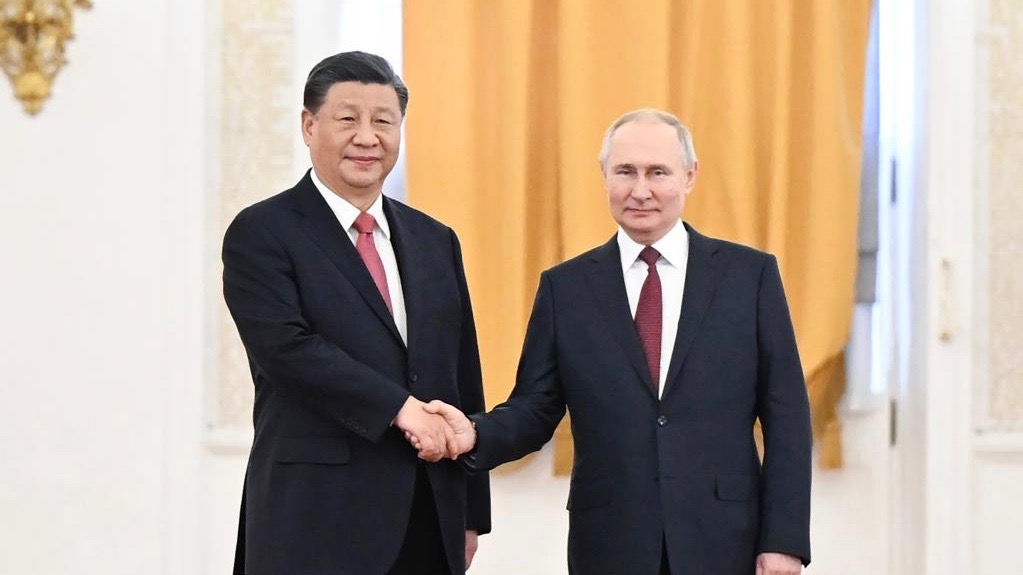Chinese President Xi Jinping concluded his three-day visit to Russia on Wednesday, March 22. During the visit, both countries signed various agreements related to cooperation in the economic, technological, and cultural fields in order to deepen their “no limits partnership.”
Russia and China also issued two joint statements focusing on ways to deepen their strategic relationship, calling for increased mutual cooperation on international platforms with the objective of challenging hegemonic practices and the creation of a multipolar world, among other aspects.
The three-day trip to Moscow, which began on Monday, was Xi Jinping’s first visit abroad since his reelection as president of the Chinese Republic earlier this month. Both countries discussed the Ukrainian crisis in detail and re-emphasized that any resolution to it can only come through a process of dialogue.
Xi also extended an invitation to Russian President Vladimir Putin to visit China in the coming months.
A multipolar world
The two joint statements—on Deepening the Comprehensive Strategic Partnership of Coordination for the New Era and on the Pre-2030 Development Plan on Priorities in China-Russia Economic Cooperation—were issued on Tuesday.
The joint statement on strategic partnership revolves around Chinese efforts to create a consensus around the principles of Global Civilization Initiative (GCI), proposed by Xi Jinping a few weeks earlier. The GCI strongly focuses on global diversity and opposes any attempts to impose a particular value system on other societies.
The joint statement asserted that the China-Russia relationship transcends conventional understandings of state-to-state military political alliances and has “the nature of no-alliance, no-confrontation and not targeting any third party,” CGTN reported.
Both countries agreed that they are opposed to attempts to impose a particular model of governance on the world by some countries and asserted that “different countries have different histories, cultures and national conditions, and they have the right to choose their own development path.”
The statement included Russian support to Chinese attempts to protect its territorial integrity and sovereignty. Putin, during his meeting with Xi Jinping on Tuesday, assured China of his country’s support on the issues of Taiwan, Hong Kong, and Xinjiang.
The statement also noted their mutual concerns about the proliferation of weapons of mass destruction recently, largely thanks to the countries of the AUKUS treaty—namely Australia, the UK, and the US— and urged NATO to stick to its regional and defensive mandate and avoid confrontation.
On Tuesday, Xi and Putin addressed a joint press conference where they emphasized their strong focus on multilateralism and cooperation on international forums such as the United Nations, Shanghai Cooperation Organization, BRICS, and G20. They reiterated their commitment to create a multipolar world by jointly countering all attempts to create hegemony by certain countries.
Ukraine crisis
In the joint statement, Russia appreciated the Chinese position on the Ukrainian crisis and called it “objective and unbiased.” The statement also asserted that China and Russia “are opposed to any states and their blocs damaging the legitimate security interests of other states in order to obtain military, political and other advantages.”
China had proposed its “position on the political settlement of the Ukraine crisis” a few weeks earlier. The 12-point proposal talks about respecting sovereignty and calls for political dialogue to resolve the issue.
Russia has repeatedly reiterated its readiness to engage in talks regarding the war in Ukraine. However, such offers have been repeatedly shot down by Ukraine and the NATO countries. The Ukrainian president had asserted that talks with Russia were unthinkable until Russian forces completely withdrew.
Even on Monday, US Secretary of State Antony Blinken said that “the world should not be fooled by any tactical move by Russia—supported by China or any other country—to freeze the war on its own terms,” and reiterated the Ukrainian proposal of talks only after complete Russian withdrawal.
The joint statement also demanded an “impartial and professional investigation” into the sabotage of the Nord Stream gas pipelines. The pipelines were blown up in September 2022. There have been claims made that the pipeline was blown up by the US in order to economically isolate Russia, but the US has denied this.





